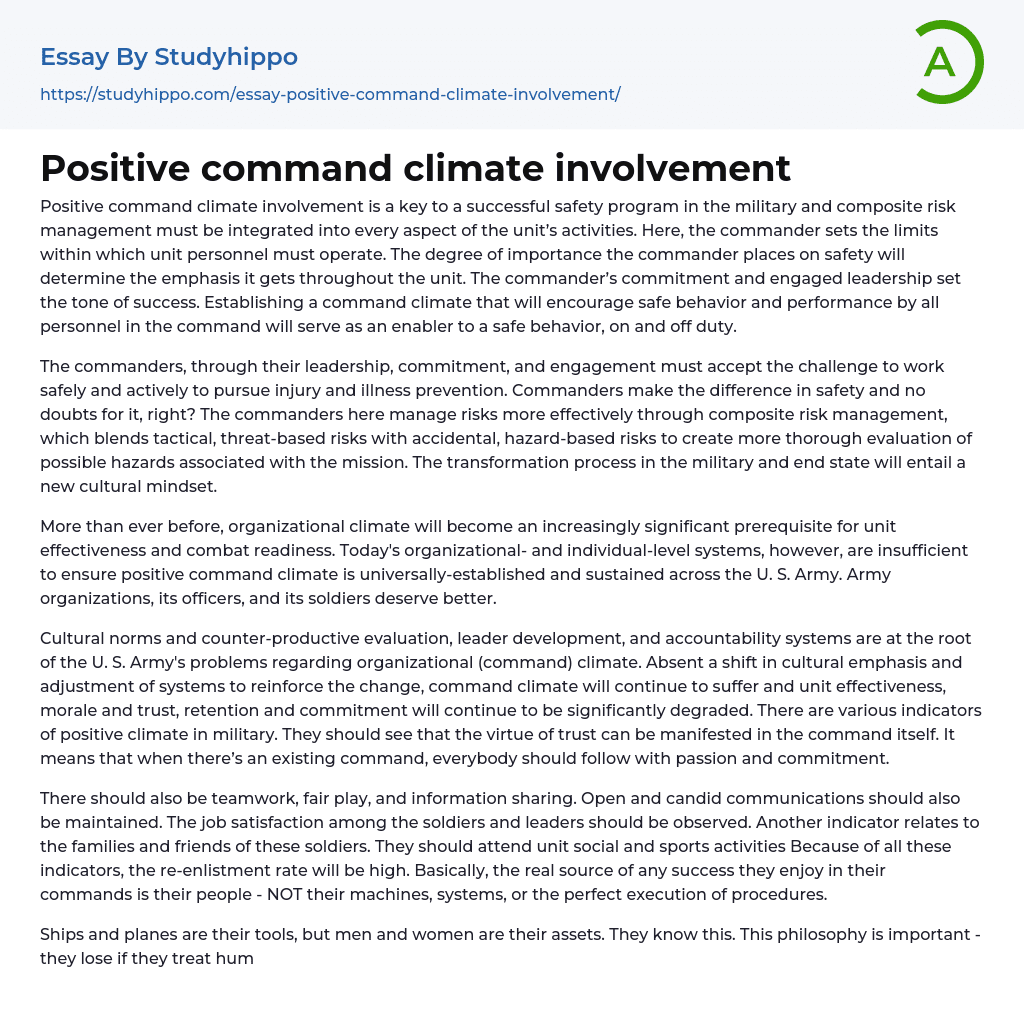Positive command climate involvement is a key to a successful safety program in the military and composite risk management must be integrated into every aspect of the unit’s activities. Here, the commander sets the limits within which unit personnel must operate. The degree of importance the commander places on safety will determine the emphasis it gets throughout the unit. The commander’s commitment and engaged leadership set the tone of success. Establishing a command climate that will encourage safe behavior and performance by all personnel in the command will serve as an enabler to a safe behavior, on and off duty.
The commanders, through their leadership, commitment, and engagement must accept the challenge to work safely and actively to pursue injury and illness prevention. Commanders make the difference in safety and no doubts for it, right? The commanders here manage risks more effectively through composite risk management, which blends tactical,
...threat-based risks with accidental, hazard-based risks to create more thorough evaluation of possible hazards associated with the mission. The transformation process in the military and end state will entail a new cultural mindset.
More than ever before, organizational climate will become an increasingly significant prerequisite for unit effectiveness and combat readiness. Today's organizational- and individual-level systems, however, are insufficient to ensure positive command climate is universally-established and sustained across the U. S. Army. Army organizations, its officers, and its soldiers deserve better.
Cultural norms and counter-productive evaluation, leader development, and accountability systems are at the root of the U. S. Army's problems regarding organizational (command) climate. Absent a shift in cultural emphasis and adjustment of systems to reinforce the change, command climate will continue to suffer and unit effectiveness, morale
and trust, retention and commitment will continue to be significantly degraded. There are various indicators of positive climate in military. They should see that the virtue of trust can be manifested in the command itself. It means that when there’s an existing command, everybody should follow with passion and commitment.
There should also be teamwork, fair play, and information sharing. Open and candid communications should also be maintained. The job satisfaction among the soldiers and leaders should be observed. Another indicator relates to the families and friends of these soldiers. They should attend unit social and sports activities Because of all these indicators, the re-enlistment rate will be high. Basically, the real source of any success they enjoy in their commands is their people - NOT their machines, systems, or the perfect execution of procedures.
Ships and planes are their tools, but men and women are their assets. They know this. This philosophy is important - they lose if they treat human systems as technical problems to be solved. Focusing on negative issues as their primary method of leadership is not the best way to keep the system healthy. Appreciation is much more powerful. Moreover, there are various fields in the military that should be considered in developing a positive command climate.
Among these fields that should be given much attention are officer leadership, promotion policy, immediate leaders, quality of training, job satisfaction, leader accessibility, rewards and corrective action for motivation, tools, and equipment and supplies as well. Other significant fields that should be looked into are the military courtesy and discipline, unit cohesiveness, social activities, morale, human relations, sports activities, freedom from substance abuse and reenlistment potential.
In
establishing a positive command climate in the military, these leaders should identify climate areas they want to influence, establish their goals and objectives for each areas, execute plan of actions for their plans and visions, establish high, attainable, clearly understood standards, encourage competition against standards rather than each other, allow subordinates freedom to exercise initiative, establish accountability at appropriate level, show confidence to subordinates, encourage and reward prudent risk-taking, achieve high performance through positive motivation and rewards, underwrite honest mistakes, share decision making with subordinates, give clear missions with boundaries of autonomy , listen to subordinates and seek ideas, demonstrate concern about the welfare of subordinates, and establish and model high ethical standards.
According to Major General John A. Lejeune, military leadership is the sum of those qualities of intellect, human understanding and moral character that enable a person to inspire and to control a group of people successfully. Thus, these leaders should develop a positive command climate that will enable them to realize their visions for the common good. The leaders in the military as well as the subordinates should practice what they preach. It takes a lot of effort and sacrifice to achieve a positive command climate. If a certain military group has a command climate, there will be a comprehensive perception by unit members. To sum it all, in achieving a positive command there should be trust, teamwork and candid communications among the military leaders and unit members.
- Weather essays
- Seasons essays
- Meteorological Disaster essays
- Precipitation essays
- Spring essays
- Winter essays
- Values of Life essays
- Ethical dilemma essays
- Normative Ethics essays
- Virtue Ethics essays
- Belief essays
- Deontology essays
- Moral essays
- Virtue essays
- Work Ethic essays
- Being A Leader essays
- Servant Leadership essays
- Leadership Experience essays
- Leadership Qualities essays
- Air Pollution essays
- Carbon Dioxide essays
- Climate essays
- Deforestation essays
- Ecology essays
- Endangered Species essays
- Environmental Issues essays
- Environmental Protection essays
- flood essays
- Greenhouse Gas essays
- Hurricane essays
- Nature essays
- Pollution essays
- Renewable Energy essays
- Sustainability essays
- Tornado essays
- Traffic essays
- Tsunami essays
- Water Pollution essays
- Acceptance essays
- Age Of Enlightenment essays
- Child Observation essays
- Confucianism essays
- Conscience essays
- Critical Reflection essays
- Destiny essays
- Determinism essays
- Empiricism essays
- Environmentalism essays
- Epistemology essays
- Ethics essays




